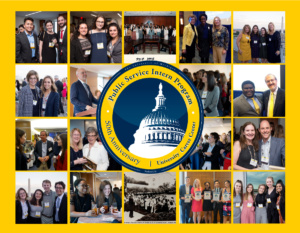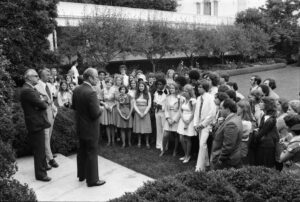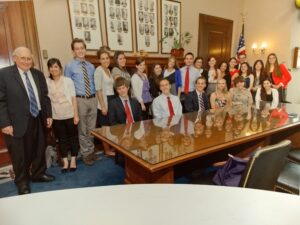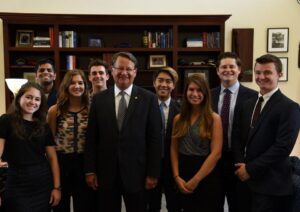
Author: PSIP Student Coordinator Rahul Rokkam, B.S. Economics ‘21
Contact: Lynn Halton, PSIP Supervisor
[email protected]
cell 248 231-5472
Bo Schembechler’s start as head football coach of the University of Michigan in 1969 launched a dominant era of Michigan football. From 1969 to 1989, he achieved an impressive record of 234-65-8, catapulting Michigan into a national title contender. The first 10 years of the Michigan-Ohio State rivalry were characterized as the “ten-year war,” with either Schembechler’s Wolverines or Woody Hayes’ Buckeyes winning or sharing the Big Ten conference championship every season. Along with sparking a dominant tradition of Michigan football, Schembechler’s first year also led to the creation of a massively successful intern program at the University of Michigan – the Public Service Intern Program (PSIP).
During the fall of 1969 (the first few months of Schembechler’s time at Michigan), two undergraduate students – Mike Posner and Betsy Levine Lassar – hatched an idea to start a Washington DC-based internship program. Seeking to enable students to gain experience in public and legislative policy through public service internships in Washington, D.C., Mike and Betsy proposed a plan for the Washington Internship Program with an estimated budget of $9,000. The two students reached out to campus leaders including Bill Audiss in Career Planning and Placement Services, Barbara Newell in the President’s Office, and President Robben Fleming to request support for the program. They waited patiently, but had not gotten a response by the end of Fall semester. Serendipitously, Mike learned from a January 1970 article in The Michigan Daily about a $9,000 surplus from the Alumni Association’s tour proceeds from Michigan’s Rose Bowl appearance. Mike walked over to the Alumni Association to speak with then-Director Bob Forman, and walked out of that meeting with a check for $9,000 to launch the Washington Internship Program!
The early years of the Washington Internship Program were marked by small intern cohorts (18-20 students per year), as Mike and Betsy worked part-time to grow the fledgling program. During the summer of 1969 in D.C., Mike started to explore internships for Michigan students on Capitol Hill, think tanks, non-profits, media organizations and other types of public service organizations. With funding in place, they both travelled to Washington in early 1970 to secure the first year’s placements. Back at Michigan, Betsy handled the operations and administration of the program.

1975, July 17 – Rose Garden – The White House – Washington, DC – Gerald R. Ford, Representatives Elford Cederberg & Marvin Esch; University of Michigan Students – standing on steps to Colonnade; students on lawn – Congressional Hour – Greeting University of Michigan Students in Washington, DC as Summer Interns
Over the next few years, the program was re-named the Public Service Intern Program (PSIP) while Mike and Betsy continued to work with PSIP students to build a strong public service experience for students. This was exemplified by Nia Kraud of the 1974-75 PSIP cohort, who wrote a letter to Michigan alumnus President Gerald Ford, reminding him of the program and students’ presence in Washington, D.C. that summer. As a result of Nia’s letter, the President quickly planned a welcome reception and hosted 64 students in the White House Rose Garden on July 17, 1975, along with Michigan Congressmen Elford A. Cederberg and Marvin L. Esch.
For the next half a century, sponsored by the University Career Center (UCC) (originally, Career Planning and Placement), PSIPers have combined both passion for public service and determination to demand the best from themselves and their elected leaders. As a non-partisan and public-service oriented group, this UCC program prepares students for successful internships through biweekly meetings, professional development seminars, scheduled office hours, career panels, alumni mentorship and networking opportunities.
Betsy aptly describes the program’s purpose: “If anything, I came away feeling, as I believe now, that it’s important to stay in the game, to respect those with whom we disagree and try to understand their perspectives, to work to bridge our differences; keeping our shared values and the larger public interest as our guideposts, and to continue working for the ideals we believe in.”
PSIP is home to students, alumni, donors, and employers of all political affiliations and fosters an environment of inclusion. With the help of the D.C. Alumni Club, the PSIP Endowed Scholarship was created during PSIP’s 50th anniversary celebration. PSIP staff aim to fully fund this scholarship so that all students who aspire to intern in Washington, D.C. will be able to do so, regardless of their financial status.

PSIP students with Senator Carl Levin
Currently in its 52nd year of preparing students for public service focused internships in Washington, D.C., PSIP has grown into a 3,000+ strong community of diverse and successful alumni. Distinguished alumni include three current U.S. Representatives (Congressman Ted Deutch of Florida, Congresswoman Grace Meng of New York, and Congresswoman Lauren Underwood of Illinois), two-time daytime Emmy award winner (Dan Solomon, PSIP 1980), and Assistant Secretary of State (Michael Posner, PSIP 1970), among thousands of others.
In addition to successful alumni, PSIP has created thousands of lasting bonds and even marriages!
Meredith Westerlund (PSIP 2012) shared that “PSIP gave me the opportunity to explore Washington, DC, which I now call home. My internship opened my eyes to new experiences and greatly impacted my career path. Not only did I meet some of my closest friends that summer, but PSIP was how I met my fiance! I’m forever grateful to the program.”
Meredith’s fiance, Matt Schneider, mentions how PSIP kick-started his professional life: “The program helped me secure my first job out of college and discover my career. It’s a wonderful opportunity for students to learn professional skills and build a foundation for their future.”

2017 Senator Peters & PSIPers
Just as Michigan football fans eagerly await another appearance in the Rose Bowl, PSIP’s 52nd cohort looks forward to another successful summer of public service internships. This summer, similar to last, most students will intern remotely with their Washington, D.C. internship sites due to covid-19. UCC continues to offer students the educational pillars of the program and alumni offer their support and expertise through mentorship and career panel discussions. The program is strong and continues to evolve, but the commitment to encouraging students to pursue careers in public service remains the underlying thread.

